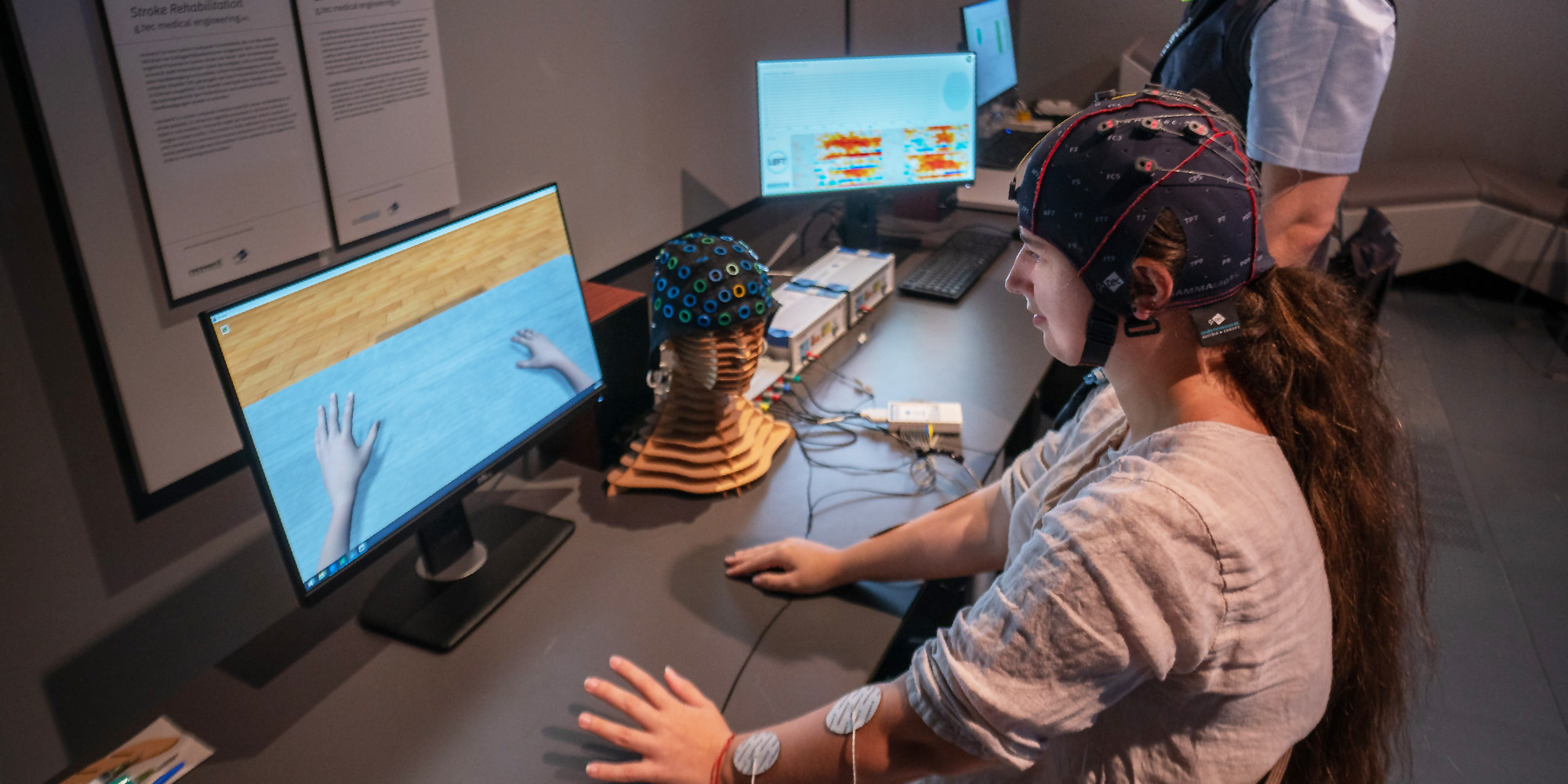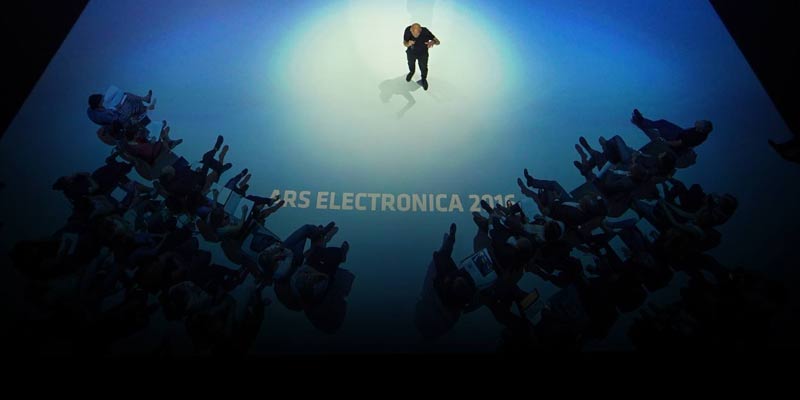Theme Week at the Ars Electronica Center
THU 7.11. – THU 14.11.2019
(Linz, 4.11.2019) Use the power of thought to paint pictures or sink billiard balls – as part of the theme week “The Human Brain and its Digital Complementation,” visitors to the Ars Electronica Center not only learn a great deal about brain computer interfaces, but can also try them out for themselves. The theme week will be accompanied by the Upper Austrian biomedical engineering company g.tec medical engineering.
The program at a glance:
Presentation: Research fields BCI / FRI 8.11., SAT 9.11. and SUN 10.11.2019 / each 3:00 p.m. to 3:45 p.m.
Christoph Kapeller from g.tec medical engineering tells visitors about the functions of brain computer interfaces, how they are used and which new research fields g.tec is currently opening up.
Presentation: The neurorehabilitation system recoveriX / SAT 9.11. and SUN 10.11.2019 / 12 noon – 12:30 p.m. and 4 p.m.- 4:30 p.m. respectively
Erika Mondria, BCI expert at the Ars Electronica Center, explains how the brain computer interface recoveriX works and how it is used in stroke rehabilitation.
Presentation: The brain assessment and therapy system mindBeagle / FRI 8.11.2019, 2:00 p.m.-2:30 p.m., SAT 9.11. and SUN 10.11.2019, 2:00 p.m.-2:30 p.m.
Erika Mondria from the Ars Electronica Center shows visitors the computer-brain interface mindBEAGLE, which enables communication with patients with a vegetative coma.
Open Workshop: BrainPool / FRI 8.11.; SAT 9.11. and SUN 10.11.2019 / 11:00 a.m.- 4 p.m.
By means of Brain Computer Interface Unicorn a robot that is controlled by focusing the thoughts will pocket billiard balls.
Open Workshop: Paint without moving your fingers / FRI 8.11., SAT 9.11. and SUN 10.11.2019 / 11:00 a.m. – 4:00 p.m.
Visitors experience that it is possible to paint a picture without any movement and only by means of thoughts.
Open Art-Installation: my brain code 1.0 / THU 7.11.-THU 14.11.2019 (except MON) / each 10:30 a.m. – 4:30 p.m.
When the word Paris is mentioned, images probably appear in most people’s minds. The processes in the brain triggered by this can be made visible using biometric measurement technology in conjunction with computer technologies. The installation my brain code 1.0 is supposed to make individual brain oscillations visible and measurable. Visitors can try out whether the installation also recognizes the city they are thinking of.
Deep Space Special: The brain in focus / THU 7.11.-THU 14.11.2019 (except MON) / each 4:30 p.m. – 5:00 p.m.
Thanks to its technical possibilities, the human body can be explored in an impressive way in Deep Space 8K. This Deep Space Special takes a closer look at the brain and explores how communication between nerve cells takes place and what a photorealistic representation of medical data might look like in the future.
Deep Space LIVE: Motion begins in the mind – neural basics of mental training / THU 7.11.2019 / 7 p.m. – 8 p.m.
Anyone who has ever watched a ski race on television knows the picture: Highly concentrated and with their eyes closed, the athletes explore the the race track before their mind’s eye shortly before the start. This mental process is called the “movement imagination” and is used by athletes and musicians to improve their own performance. At Deep Space LIVE, Thursday evening, 7.11.2019, Dr. Selina Wriessenegger from the Institute for Neural Engineering at Graz University of Technology tells what modern brain research has discovered about concepts of movement.
Lecture: The measurement of living humans / SAT 9.11.2019 / 11:00 a.m. – 12:00 noon.
In modern neuroscience, there are various complex methods for measuring brain activity that are constantly being improved and further developed. Natalia Zaretskaya from the University of Graz presents examples from research and explains what modern imaging methods for measuring brain activity can already achieve and how informative the results are.
Lecture: Stroke – What happens in brain and body / SON 10.11.2019 / 4:30 p.m. – 5:30 p.m.
Strokes are the most frequent causes of death in Austria. But how is a stroke recognised and what happens in the brain from a neurological point of view? Prim. PD. Dr. Tim J. v. Oertzen, Head of Neurology at the Neuromed Campus of the Kepler University Hospital, will give a vivid introduction to the topic, from the recognition of symptoms to preventive measures and new treatment methods.
Deep Space LIVE: Brain-body computers – artistic, scientific and medical applications / THU 14.11.2019 / 7 p.m. – 8 p.m.
How does the communication between brain, body and computer actually work? Erika Mondria from the Ars Electronica Center and neurotechnology expert Alexander Heilinger present examples from the fields of art, science and research. During a live presentation of g.tec medical engineering’s recoveriX rehabilitation system, visitors will be able to try out for themselves how BCI-controlled hand movements feel.
http://www.flickr.com/photos/arselectronica/47949331051/
recoveriX – g.tec medical engineering / Fotocredit: vog.photo / Printversion
http://www.flickr.com/photos/arselectronica/49011932491/
recoveriX – g.tec medical engineering / Fotocredit: Ars Electronica – Robert Bauernhansl / Printversion


